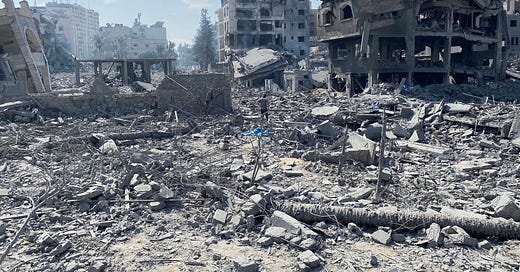Unravelling the final threads of the international system?
More emphasis is being put on the 'nexus' between development, peace and security, and humanitarian action just as the war in Gaza is putting confidence in the international system at breaking point
Destruction in Gaza. Image: Palestinian News & Information Agency (Wafa) in contract with APAimages, licensed under CC BY-SA 3.0 DEED
Palestine has always laid bare the weaknesses of the international system to build and maintain peace and security. For 75 years, the world has failed to deliver peace, security, and dignity for Palestinian people. Through countless resolutions, meetings, and vetos, an extraordinary price continues to be paid for this failure, one that falls disproportionately on the women and children of Palestine.
This has been the case for as long as memory serves. But despite the failure to address this elephant in the room, international policy frameworks have continued to be constructed. The corpus of International Law and International Humanitarian Law has continued to expand.
Global women’s civil society has continued to contribute to the development, implementation and oversight of important mechanisms to improve the situation of women: CEDAW, universal periodic reviews, the women, peace and security agenda.
On the international stage, there is greater recognition of the overlap between the aims and means of achieving sustainable development, of building and maintaining peace, and responding to humanitarian emergency. The humanitarian, development and peace nexus is seen as increasingly important.
But have we finally reached a breaking point?
Last week, the International Court of Justice found it plausible that Israel is committing genocide against the Palestinian people in Gaza. It called for an end to the killing of Palestinians and the wanton destruction of Gaza.
In the face of this ruling, Israel has not even flinched, while the United States has continued to do nothing to reign in the destruction.
It is not a new development that nations pick and choose which victims they consider to be worthy, which perpetrators they will hold accountable, which outrages to be outraged about. Indeed, Israel has been condemned previously for its culpability for acts of genocide.
The double standards in the application of accountability for violations of international law and international humanatarian law are not something new. We have always been aware of them.
Have, however, the contradictions finally become too much for the international system to bear?
What faith can we have in mechanisms that are not bringing peace, under which militarised solutions are increasingly being deployed in matters of security, and where laws and justice are applied in profoundly partial ways?
This is a fundamental question raised in our recent work exploring the peace and security and humanitarian nexus. This nexus is a key issue for us given the prevalence of humanitarian needs and threats to peace and security in our region, and a key reason that we are a board member of the Women, Peace and Security and Humanitarian Action Compact.
In exploring the issue, we found that there remain clear barriers to achieving better coordination between women, peace and security and humanitarian action - not least the continuing lack of women in leadership. It emphasises that we must be more critical of the international instruments and mechanisms if we are to actually make progress.
But progress of any sort is at serious risk if members of the international community continue to undermine confidence in the international system.
There can be few wake-up calls more alarming than hearing experienced women, peace and security practitioners questioning the utility of these frameworks.
Among the people we consulted were women who have achieved so much for the women, peace and security agenda: building political will, making an international agenda relevant to their communities, making Security Council resolutions real. As our report makes clear, we cannot afford to lose these advocates and activists.
The direct and short term consequences of Israel’s continued atrocities in Gaza and the West Bank are appalling enough: suffering on an unimaginable scale. The longer-term and indirect consequences threaten the foundations of an international system that many developed nations claim to hold to.
The truth of their commitment lies in broken amidst the rubble of Gaza.
For years, governments have relied on the labor and determination of civil society to make women, peace and security a reality. When we ask these same countries to uphold international law, to protect civilians, they are silent, immobile.
Can we trust these governments as partners? Can we trust an international system that even they do not believe in?
Hibaaq
Welcome to the new Karama Substack newsletter. To stay in contact and provide a better experience for you, Karama has moved to using this service for our news, updates and analysis. We hope you will enjoy it, do please provide any feedback.





